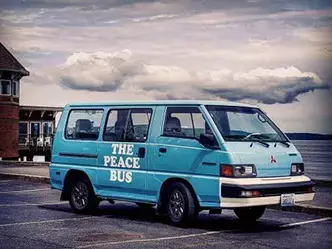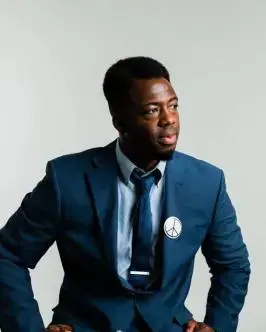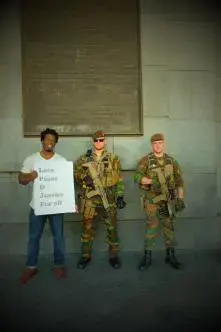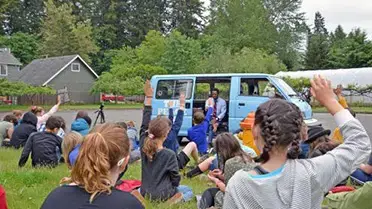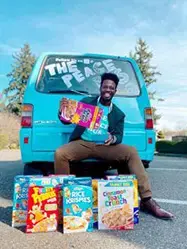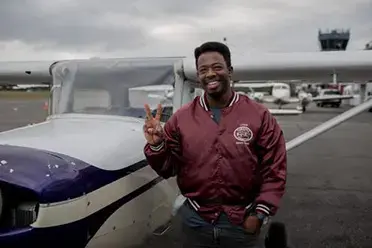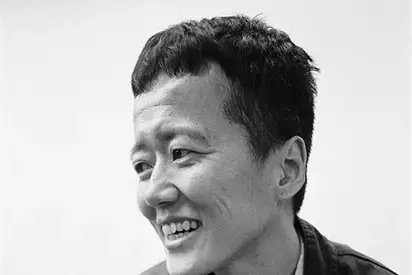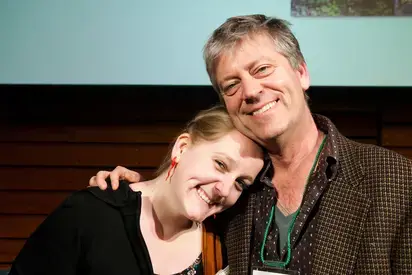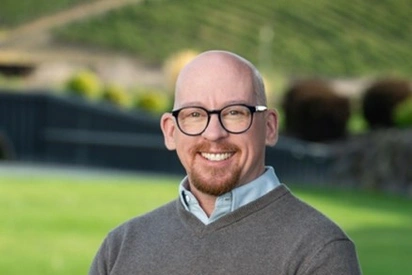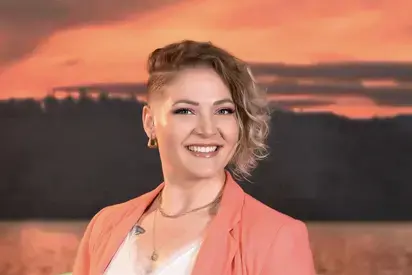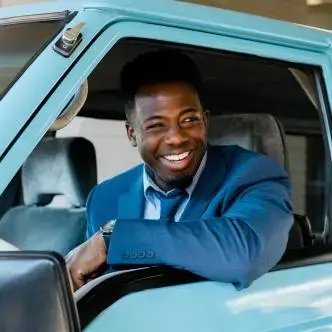
If you happen to live in the beautiful city of Tacoma, you may have seen Kwabi Amoah-Forson `15 driving around the area in his ‘you can’t miss it’ baby blue, unique, Mitsubishi van with “The Peace Bus” labeled on the side. Handing out socks, food, and other necessities to those in need, and stopping by local elementary schools to donate children’s books centered around peace–Kwabi has long been a shining light for the Tacoma Community and the South Puget Sound.
Kwabi has received numerous awards for his inspiring community work. But his path to this point wasn’t always clear – as with most journeys in life, there were twists and turns along the way. It was while attending The Evergreen State College Tacoma, which he graduated from in 2015, that Kwabi found his calling in life.
“I transferred to Tacoma Community College (TCC) after my time at Western Washington University (WWU) where I was failing in my grades, not fully present in the classroom. I remember my mother came to pick me up and said you are coming home. I was lost and confused, sad I had to leave my life behind at WWU. I attended TCC for a little while but still did not know what I was doing. At TCC, I was able to bring my grades up and then I was accepted into The Evergreen State College Tacoma. That’s when everything changed,” says Kwabi.
While at Evergreen Tacoma, the culture and curriculum Kwabi found was like nothing he had ever experienced before.
“It transformed my concept of what education can be. We were discovering together. At Tacoma, we had Lyceum discussions where we could really analyze a subject or concept and work through it together versus independently. For the first time ever, all my faculty were Black, there was diversity on campus, and it was special. I could actually see myself in my professors. It was a new life, and I was finally immersed in a group with people like me, being in a physical space and seeing faculty together impacted me. Like I am a part of something bigger than myself and that whatever they are doing, I can do it too. At Evergreen, they rally around their students. I didn’t feel like any of my classmates were drowning or falling behind,” Kwabi explains.
When Kwabi graduated, he went on to work as a case manager at Mental Health Resources in Tacoma and pursued a master's degree in business at City University of Seattle. Still, Kwabi felt he was not fully serving his true purpose in life –his passion – and eventually he went back to Evergreen Tacoma to reconnect with his academic advisor, Peter Bacho.
“I walked into his office saying, ‘Dr. Bacho, I am struggling! I don’t know why I am in this business school. I am learning a lot, but I am surrounded by people who are solely concerned about making money.’ He said, ‘Kwabi,’ with his cool voice, ‘You need to stop asking yourself what do you want to be and start asking yourself who do you want to be. You need to ask yourself about the ethics, morals, and guidelines of which you want to live your life. That is who you are. Think about these things, and once you understand, everything will fall into place.’
“I took a weekend to myself and just thought: Who am I? What is the root of my spirit, my soul? No matter who I am, I love seeing people from different walks of life coming together for a positive cause. It gives me chills thinking about it, it is so beautiful, it is everything to me. I thought, what is that? And to me it is peace, it is the essence of us coming together in a collective force for the greater good of humanity. So, I have this idea now, how do I promote or get involved with it? That is where my research began with peace activists throughout history,” reflects Kwabi.
When researching peace activists, Kwabi came across Brian Haw, a London peace campaign activist. Haw peacefully protested the US and UK military sanctions on other countries, specifically in the Middle East, after the 9/11 terror attack. Haw protested for eleven years consecutively. Most known for his signs promoting peace and humanity that were set up along his protest camp, Haw’s prolonged efforts shined a light on unity.
Kwabi explains his thoughts back then, "If Haw can do that for eleven years, the least I can do is go to Wright Park in Tacoma on weekends and promote peace. I am not going to preach, I am just going to sit and talk to people about peace. So, I went to Wright Park on Saturdays to do this, and I created two posters, one saying 'Love, Peace, and Justice for All’ and the other saying ‘War is Not the Answer, Say No to Violence.’
“The first couple people who came up to me would ask, ‘What are you selling?’ and I would share that I was not selling anything, so then they would ask, ‘What are you doing here?’ ‘I am here to talk about peace,’ I would reply. ‘Oh, so is this a religious thing?’ And I would say, ‘No, I am just here to know what peace means to you.’ People were put off at first, but then they started catching on and I started having these great conversations about peace. People would bring their significant other, their family, their kids, so eventually on Saturdays I was expected at the park. I looked forward to it just as much as the people at the park did. Joggers would wave as they ran by, people would honk as they drove by since I was at the corner of the park. I had a table, two posters in front, my radio playing classical music, and a tent just in case it rained.”
Eventually, Kwabi started walking around Tacoma and asking people what peace meant to them. This led to visits to Seattle, Portland, Vancouver B.C., and San Francisco. Each stop led him to think of his project in bigger terms.
In late 2017, after reconnecting with a good friend who was working at a US military base in Europe, Kwabi was invited to bring his peace talks across the Atlantic. He spent time in London, Dublin, Cologne, Brussels, and Amsterdam. Kwabi shared that the answers he received from the people he met along his travels varied greatly and could be as simple as ‘Getting away from my ex is peace’ to deeper and more complex conversations like ‘The US having armed forces in almost every country is not peace; peace is when the US removes all armed forces from other countries.’ As this work grew and transformed, Kwabi found himself pivoting to encourage others to join his message of peace and solidarity. As Kwabi puts it, “I see my job as a peace campaigner. I am not an activist. My job is to campaign for peace like it is a product, to get people interested in peace, to make it trend. Because if people don’t hear about it or aren’t invigorated by it, how can we spread it? How can we really have it be implemented in society?”
One of Kwabi’s biggest inspirations for his current work is Abi Nathan, a humanitarian who came to prominence in the 1960s. Nathan is known for his peace flight on his plane Peace One. He flew from Tel Aviv to Cairo in the name of peace and to bridge the conversation between Israeli and Arab peoples. Though Nathan did not land in Cairo but in a smaller airport nearby, he was treated with kindness, generosity, and humility by those at the airport who were Arab. Nathan’s traveling peace message deeply impacted Kwabi and led him to create the project he is most known for: The Peace Bus.
“I wanted a VW Bus initially, but then I researched them and found out they aren’t typically in great condition, and it can be hard to fix them. But being a peace campaigner, I needed a weird looking car that makes people look at it. Then I came across a guy selling this weird Mitsubishi van car and I reached out to him. We met and, after I drove it around, decided to purchase the van with my tax refund. I painted the van blue because Mildred Norman, the Peace Pilgrim, stated ‘The color of peace is blue.’”
As soon as Kwabi began driving his blue Peace Bus around Tacoma, he saw its positive impact on the community.
“I pulled up to Fred Meyer,” he recalls, “I parked the bus, got out, and there was this little girl with her mom. She must have been learning how to read because she said, ‘The Peace Bus’ and turned to her mom and asked, ‘What is peace?’ Her mom said, ‘We will talk more about it later.’ I was like, ‘Oh my god, that's what this is, this is why I am driving this around.’ When she said, ‘The Peace Bus,’ her face was already lit up, because it was this cool looking vehicle, and she had a positive connotation with the word, not even knowing what it meant. It was a big moment for me.”
At first Kwabi’s plan was to drive The Peace Bus around and spread messages of peace, but he noticed that this van was different from others. It had a huge gap in the middle of it where seats typically are located. Kwabi thought, “If I am going to talk about peace and drive around, then why don’t I put peace into action?” Then, the humanitarian aspect of Kwabi’s peace work really began.
“I started delivering things to people in need, transporting goods to children, and other campaigns supporting the community. I coined the term 'local humanitarian aid', because when you say humanitarian aid people think of Southeast Asia or Africa, but people need help right here in Tacoma. The first thing was the sock drive campaign. I received $500 in donations, went to Cosco to pick up high-quality, durable, thick socks and then drove around Tacoma and gave them out to people on the street, in homeless shelters, and care facilities.”
The sock drive campaign not only supported the local community by providing necessities for those in need, but it also filled Kwabi’s heart when he saw his peace humanitarian work reflected now in the world around him.
“I was at a shelter giving out food and a man walks by wearing tattered and dirty clothing. When he sat down his pant legs rode up, and I saw these nice bright white socks. So, I walked over to him and said, ‘You got some really nice socks man!’ And he replied, ‘Yeah, a year ago you came with that blue bus and gave them to me.’ I was like, ‘Oh my god, you still have them?’ He said, ‘Yeah, they are the best socks I ever had.’ He remembered me, remembered the bus, remembered the socks, and he took pride and care of these socks. Putting on new socks, we take them for granted. To have this man remember it –something we deem so small –and how it impacted him really resonated with me and it was an immensely powerful experience.”
The Peace Bus has since been a part of numerous campaigns bringing cereal and food to school kids, hosting book drives, procuring donations for basic necessities, delivering gifts to children at Christmas, and even featuring in a children’s TV show called The Peace Bus. In the short few years that The Peace Bus has been around in South Puget Sound and greater Tacoma, Kwabi has received the 2022 Tacoma Peace Prize Laureate Award, 2022 Best Local Celebrity by South Sound Magazine, 2021 South Sound Business Magazine 40 under 40 Award, the TCPAR (Tacoma Pierce County Association of Realtors) 2021 Citizen of The Year Award, and the 2021 City of Destiny Award for Adult Leadership from the City of Tacoma. Kwabi has also presented as a panelist and speaker at numerous South Puget Sound events.
Kwabi’s exciting next Peace Bus campaign will launch in July 2022. 'Every Kid Eats', running from July 1st to September 1st, will connect Tacoma restaurants with children 18 years or younger who need a free meal. “The more restaurants get involved, the less kids go hungry in our city,” says Kwabi. Learn more about this new campaign here or watch the video below.
We can all relate to this message of peace from Kwabi: “To love is always the right choice. We get caught up in the world and our lives. Sometimes we have fleeting thoughts of connecting with an old friend or someone we know or love, and then it escapes us. But try to grab that fleeting thought and reach out because you will feel better afterwards.”
The future of The Peace Bus is bright, but it is also up in the air. "I am continuing to go to flight school and saving up for The Peace Plane,” Kwabi says. “I hope to one day be the first person to circumnavigate the globe in promotion of world peace, document the journey, and talk with people everywhere about what we can do to bring the world together in peace.” As Kwabi has navigated life’s winding paths, he has found himself thanks to the support and education provided by Evergreen. Life is more than what you want to be, it is who do you want to be in this world. Evergreen Tacoma’s motto, ‘enter to learn, depart to serve’ is exemplified within Kwabi as he continues to serve his community and the globe.
Learn more about The Peace Bus and keep up to date with Kwabi’s events, campaigns, and activities, as well as how to volunteer with him, here.
